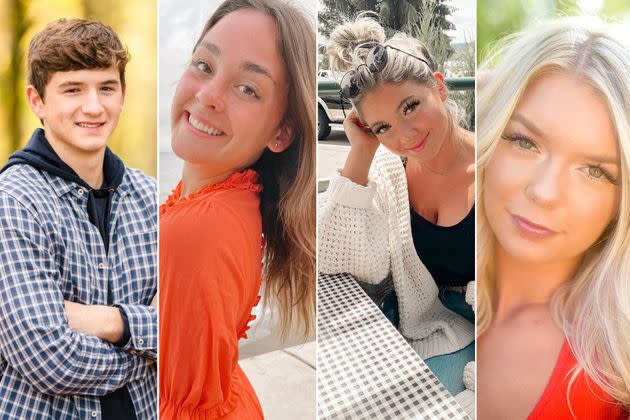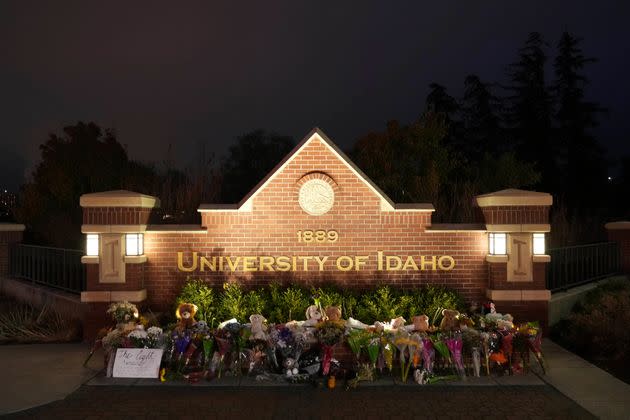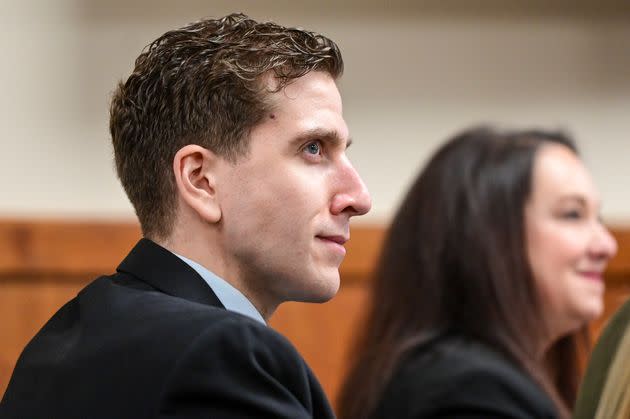A TikTok Psychic And A Professor Are Facing Off Over An 'Outrageous' True Crime Conspiracy
This is an excerpt from our true crime newsletter, Suspicious Circumstances, which sends the biggest unsolved mysteries, white collar scandals, and captivating cases straight to your inbox every week.Sign up here.
As Bryan Kohberger’s murder trial approaches for the stabbings of four University of Idaho students, a legal sideshow is taking place: a history professor’s defamation lawsuit against a TikTok “psychic” who claims (without any basis beyond her “spiritual investigation”) that the professor perpetrated the mass killings.
Ashley Guillard, a Texas tarot card reader, said in a series of TikToks that University of Idaho history professor Rebecca Scofield was having an affair with one of the four victims and orchestrated their killings to cover it up. Again, there’s no evidence of this — even a judge has called it an “outrageous” claim — but it’s resulted in months of legal proceedings in federal court and a wild attempt by Guillard to countersue the professor.

Ethan Chapin, Xana Kernodle, Kaylee Goncalves and Maddie Mogen.
Guillard began leveling her accusations about 10 days after Madison Mogen, 21; Kaylee Goncalves, 21; Xana Kernodle, 20; and Kernodle’s boyfriend, 20-year-old Ethan Chapin, were killed in their off-campus home in Moscow, Idaho, in the early morning hours of Nov. 13. Despite the preposterousness of Guillard’s claims, they gained traction — or at least attention: Her TikToks were viewed millions of times.
The killings coincided with the height of a new era of internet sleuthing. People were hungry for true crime content, and TikTokers were happy to feed their appetite. One of the most popular types of TikToks, makeup tutorials, fused with true crime, with people dissecting and theorizing cases while disconcertingly dotting their faces with different shades of makeup from a contouring palette.
As weeks went by with no suspect publicly named, the frenzy of theories only increased. Police were forced to dispel a number of rumors spread by TikTokers and other social media platforms who doxed innocent people, harassed local business owners and made villains out of the victims’ roommates and boyfriends, sorority and fraternity members, and even a guy hanging around a food truck where Goncalves and Mogen picked up pasta shortly before their deaths.
While most amateur crimesolvers followed “clues,” Guillard relied on her “psychic intuition.” As U.S. Magistrate Judge Raymond Edward Patricco Jr. pointed out when rejecting her recent counterclaims against Scofield, her “spiritual research” based on Tarot readings led her to the University of Idaho History Department, which Scofield chaired, and “spiritually inquired” into each person listed on its webpage. Guillard said she zeroed in on Scofield using her “intuitive abilities,” “spiritual acuity” and “investigative skills.” In TikTok after TikTok, Guillard insisted that Scofield had been romantically involved with Goncalves and enlisted Goncalves’ ex-boyfriend to kill her and her friends. (Again, there’s no evidence Scofield and Goncalves even knew each other.)
Scofield’s attorneys sent Guillard two cease-and-desist letters, on Nov. 29 and Dec. 8, 2022, demanding that she stop posting and remove all defamatory TikToks and apologize to Scofield. Guillard refused — and, as Scofield’s defamation suit notes, posted more than 20 new TikToks between Dec. 18 and 19, continuing to paint Scofield as the mastermind behind the killings.
The defamation suit, filed Dec. 21, 2022, claims that Guillard used “the community’s pain for her online self-promotion” — which could be said for many TikTokers, whether deliberately or simply insensitive to the effects their wild speculation and rumormongering would have on innocent people, the victims’ loved ones and the investigation itself.
Guillard continued making the claim even after Kohberger was arrested on Dec. 30, saying he was just a pawn in Scofield’s alleged scheme. Kohberger has pleaded not guilty to the killings, and though many questions remain about the case, a grand jury found enough probable cause to indict him in May.

Flowers and other items are displayed at a growing memorial in front of a campus entrance sign for the University of Idaho on Nov. 16, 2022, in Moscow, Idaho.
Scofield, who has taught at the University of Idaho since 2016, was in Portland, Oregon, with her husband visiting friends the weekend of the murders. She asserts in her lawsuit that neither the victims nor Goncalves’ ex-boyfriend attended any classes she taught, and she doesn’t recall meeting any of them. Guillard, who lives in Texas, has never been to Moscow.
In the defamation lawsuit, Scofield’s attorneys said that Guillard’s TikTok account — which has since been taken down — had more than 100,000 followers and that some of her TikToks claiming Scofield was responsible for the killings had 2.5 million likes. As a result, the lawsuit alleges Scofield’s name was linked to “murder” in a basic internet search, tarnishing her reputation, making her the subject of “online ridicule and threats from Guillard’s online commenters” and causing her to fear for her and her family’s safety.
Guillard’s statements have caused Scofield “significant emotional distress,” the defamation lawsuit claims. “She fears for her life and for the lives of her family members. She has incurred costs, including costs to install a security system and security cameras at her residence. She fears that Guillard’s false statements may motivate someone to cause harm to her or her family members.”
As the case continues, Scofield is also facing legal bills, and a friend organized a GoFundMe to help defray the costs. But Guillard said in a July 21 court hearing that she’s the one taking a financial hit because the suit and its publicity deprived her of the ability to exercise her spiritual practice, while Scofield is “gaining money” from crowdfunding efforts and “grew in popularity and support.”
“She said she lost sleep — it didn’t hurt her at all,” Guillard told the judge. “She did those things” — meaning the killings — “that’s why she lost sleep.”
Guillard continued to lean in: “Rebecca Scofield, what I said about her is true.”
In her counterclaim, Guillard (who has represented herself in the proceedings) said she planned to subpoena Meta for all messages on Scofield’s Facebook and Instagram accounts from June 1, 2021, to the present, as well as Scofield’s Facebook friends list (and anyone she has unfriended), and communications between Scofield and any University of Idaho students, including (but not limited to) the victims and Goncalves’ ex-boyfriend beginning in June 2021. She also wanted to see any communications that mention Guillard’s name, social media handles and the word “TikTok.”
It’s an astounding request that the judge criticized as “a fishing expedition” and a “ready, fire, aim” approach that is not permitted under federal law as he ruled to dismiss the counterclaim.
“In short,” Patricco said, “the pleading requirement does not provide a key to ‘unlock the doors of discovery for a plaintiff armed with nothing more than conclusions’; again, a complaint must be plausible on its face.”

Bryan Kohberger listens during a motion hearing regarding a gag order in Latah County District Court on June 9 in Moscow, Idaho. Kohberger is accused of killing four University of Idaho students in November 2022.
In Guillard’s counterclaims and comments in the hearing, she portrayed herself as the victim, saying Scofield “incited an online riot” against her, threatened her livelihood as a spiritual adviser and discriminated against her religion. In response, Wendy Olson, Scofield’s attorney, said, “She can have those beliefs and practice that as a religion, but what she can’t do is use them to defame someone.” If a religion believes in animal sacrifice, she said, “you can’t go sacrifice your neighbor’s dog.”
Patricco noted that Guillard’s “attempts to equate her spirituality with a protected religious class” is “immaterial” in this claim. Scofield’s lawsuit, he said, “cannot be read as an attack on [Guillard’s] spirituality, but on [her] false claim that [Scofield] murdered four people.”
“This is a motion where facts do not exist at all,” Olson told the judge.
Patricco seemed to agree. “Based solely on her claimed ability to psychically divine the truth, Defendant makes extraordinary allegations about how Plaintiff orchestrated the murder of four people to cover up a secret, romantic relationship with one of the victims,” he said in dismissing Guillard’s countersuits. “These claims are not only conclusory and unverifiable, but arguably so outrageous as to be clearly baseless and, thus, implausible.”
If Scofield’s defamation suit goes to trial, it would begin no earlier than January 2024. Kohberger’s criminal trial is set for Oct. 2.
